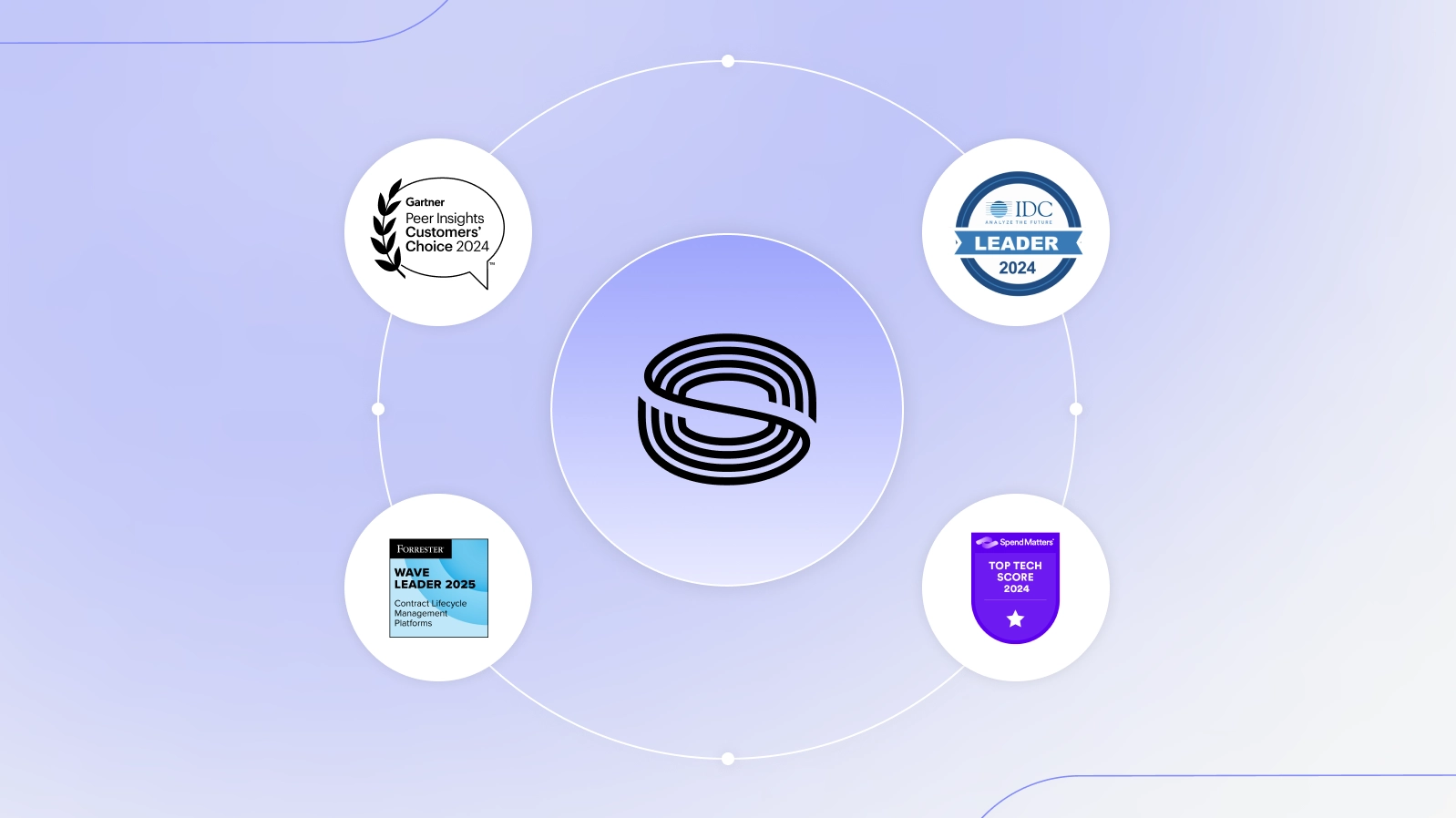What Is Contract Negotiation Software and Why It Matters

- April 16, 2025
- 15 min read
- Arpita Chakravorty
Contracts power every business relationship. But negotiating them? That’s where the friction lives. Whether you’re sealing a multimillion-dollar deal or renewing a vendor agreement, the back-and-forth can be tedious, time-consuming, and full of risk.
Enter contract negotiation software — a category of tools designed to cut the noise and get deals done faster, smarter, and with fewer surprises.
What is Contract Negotiation Software?
Let’s clear the air. Contract negotiation software isn’t just a fancy document editor.
It’s a specialized tool — often part of a broader Contract Lifecycle Management system — built to help legal, procurement, and sales teams manage the review, redlining, and approval process of contracts. Think of it as Microsoft Word on performance enhancers, tailored to the legal and business intricacies of contracts.
These platforms allow users to:
- Collaborate in real-time on redlines and comments
- Track changes across versions
- Automate clause suggestions based on pre-approved playbooks
- Detect risks and deviations from standard terms
- Speed up approvals through integrated workflows
In short, it’s where legal precision meets workflow efficiency.
Who Needs Contract Negotiation Software?
If your company deals with contracts — and let’s face it, that’s everyone — this software can be a game changer.
- Legal Teams: Tired of juggling redlines in email chains? Negotiation software centralizes it all and gives legal teams a clear audit trail, risk insights, and faster turnaround.
- Procurement: Vendor agreements, service contracts, rate cards — these get messy fast. With negotiation tools, procurement can ensure terms align with internal policies and avoid unnecessary back-and-forth.
- Sales: Time kills deals. Sales teams need contracts to move fast. With negotiation software, approvals and edits don’t become roadblocks.
- Finance and Compliance: Risk visibility is everything. These tools let finance and compliance stakeholders track liability, financial exposure, and deviation from standard terms in real-time.
If you’re involved in reviewing, approving, or managing contract language — you’re a stakeholder.
Benefits of Contract Negotiation Software: Why It Matters More Than Ever
The business world is faster, more global, and more regulated than ever. Manual contract negotiations can’t keep up.
Here’s why contract negotiation software is no longer a “nice-to-have”:
- Contracts Are More Complex: It’s not just NDAs and MSAs Today’s contracts often span multiple documents, countries, and business functions. Manual reviews are prone to gaps.
- Risk Is Real: One bad clause can sink a deal, trigger litigation, or expose your company to regulatory trouble. These tools help you spot risks before they turn into problems.
- Time Is Money: The longer a contract sits in review, the more momentum is lost. Shortening negotiation cycles improves win rates, cash flow, and business agility.
In short, better negotiation processes don’t just make legal happy — they directly impact your bottom line.
What Are You Actually Negotiating? Essential Elements of Contract Negotiation
Not every word in a contract is up for debate. But certain elements almost always are — and they matter.
Here are key parts of a contract that negotiation software helps you review with precision:
- Payment Terms and Pricing: Is it net 30 or net 60? Are there late fees? Discounts for early payment? These details can significantly affect cash flow and profitability.
- Liability and Indemnity: Who’s responsible if something goes wrong? These clauses protect against future disputes — and need careful attention.
- Service Levels and Penalties: In performance-based contracts, service level agreements (SLAs) and the consequences of missed targets are often points of contention.
- Intellectual Property: Who owns what? Especially critical in tech, media, and consulting contracts.
- Termination and Renewal: Can either party exit early? Will the contract auto-renew? These terms often get glossed over — until it’s too late.
Good software flags these high-stakes elements automatically, so you don’t miss a thing.
When to Make the Switch to a Contract Negotiation Software?
Every business hits a tipping point. Here’s how to know you’re ready to invest in contract negotiation software:
- You’re Drowning in Versions: If you’ve got contract files labeled “Final_v9_ACTUALLYfinal”, it’s time.
- Bottlenecks Are Costing You Deals: Sales stuck waiting for redlines? Vendors frustrated by delays? These are signs your negotiation workflow isn’t scaling.
- Legal Is Burned Out: Your in-house counsel wasn’t hired to play hide-and-seek with clauses. If they’re overwhelmed, automation helps.
- You’re Growing Fast: More deals = more contracts. Software lets you scale without doubling headcount.
Bottom line: If contracts are slowing you down instead of moving you forward, it’s time.
The Challenges: What’s Holding Teams Back in Contract Negotiations?
Even with the right tools, contract negotiation can hit bumps. Some of the most common issues include:
- Lack of Standardization: When teams don’t use consistent templates or clause libraries, negotiations become chaotic.
- Limited Visibility: Without a centralized platform, it’s hard to track who made what change — and why.
- Misalignment Between Teams: Legal, sales, and procurement often have different goals. Software helps bring everyone onto the same page — literally.
- Legacy Workflows: Relying on Word docs and email threads creates delays and increases the chance of missed edits or version confusion.
The right contract negotiation software tackles all of these, but only if it’s smart enough to keep up with the complexity of modern deals.
Key Features to look for in a Contract Negotiation Software
Not all negotiation tools are created equal. Some are just dressed-up document editors. Others are full-blown workflow engines. If you’re shopping for contract negotiation software, here’s what actually matters:
- Real-Time Collaboration
Multiple stakeholders need to weigh in — legal, sales, procurement, finance. Look for tools that support simultaneous editing, @mentions, and comment threads in one shared space. - Version Control That Makes Sense
Forget digging through email chains to find “the real final.” The right software tracks every change, shows a clear audit trail, and lets you roll back or compare versions easily. - Clause Libraries and Playbooks
Speed matters. Clause libraries give you quick access to pre-approved language, while playbooks guide users on fallback positions and escalation rules. This keeps negotiations fast and compliant. - Risk and Deviation Detection
Smart tools don’t just spot differences — they understand what’s risky. Features that highlight deviations from standard terms (and explain why they matter) can be the difference between catching an issue early or fixing it after the fact. - Workflow Automation
Manual handoffs kill momentum. Look for customizable workflows that automatically route contracts for approval based on deal size, type, or risk level. - AI-Powered Redlining and Suggestions
Top-tier platforms now use AI to suggest edits, identify vague language, and even rewrite clauses. These aren’t gimmicks — they cut hours out of the process and raise the quality bar. - Integration with Your Stack
The software should work where you already work — CRM, ERP, e-signature, document management. If it doesn’t plug in cleanly, it’ll create friction instead of solving it. - Audit Trails and Compliance Tools
You need a record — not just for legal, but for internal governance and external audits. Built-in compliance checks and searchable logs keep you covered.
In short: the best software doesn’t just help you edit faster. It helps you negotiate smarter.
Meet the Future: AI That Knows Contracts Better Than You Do
Artificial intelligence isn’t just a buzzword anymore — it’s transforming how contracts are reviewed and negotiated.
Enter Agentic AI in CLM platforms.
This isn’t just about auto-complete or clause suggestions. We’re talking about AI agents that behave like tireless junior lawyers — scanning contracts, identifying issues, proposing edits, and learning as they go.
Smart Issue Detection
AI agents like Sirion’s IssueDetection Agent don’t just look for words — they understand meaning. They compare clauses against your playbook, flag contextual deviations, and help you categorize issues by risk level.
You don’t just see that something changed — you understand why it matters.
Redlining That Feels Human
Sirion’s Redline Agent goes a step further. It makes surgical edits — fixing just the part of a clause that’s problematic, not rewriting the whole thing. It even explains changes in plain English, so you’re not left guessing.
Together, these AI agents give you:
- Faster turnarounds
- More consistent reviews
- Greater confidence in your edits
And unlike static templates, they learn and adapt with each contract.
So Why Sirion for Contract Negotiation platform?
There are plenty of CLM solutions out there. But Sirion stands out — especially when it comes to negotiation.
Here’s why:
- It Sees the Forest and the Trees: Sirion doesn’t treat contracts as a jumble of documents. Its AI looks at the full picture — spotting risks not just within clauses, but across interlinked agreements. That means you catch more, miss less, and negotiate with full context.
- It Understands Legal and Business Terms: Other tools struggle with tables, rate cards, and SLAs. Sirion handles them with ease, making it a go-to for procurement and commercial teams — not just legal.
- It’s Built for Precision: Sirion’s AI doesn’t just flag problems — it proposes tailored, legally sound solutions. You stay in control, but with smart support that gets you to “yes” faster.
- It Grows With You: Whether you’re handling 50 contracts or 5,000, Sirion scales. And with every deal, it learns — making the next negotiation even smarter.
Final Word: Don’t Let Contracts Slow You Down
The way you negotiate contracts says a lot about how your business runs. Manual processes mean delays, risk, and frustration. Smart software — especially AI-driven platforms like Sirion — gives you speed, control, and peace of mind.
Contracts should open doors, not create roadblocks.
With the right contract negotiation platform, you can negotiate faster, reduce risk, and focus on what really matters: growing the business.


